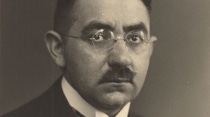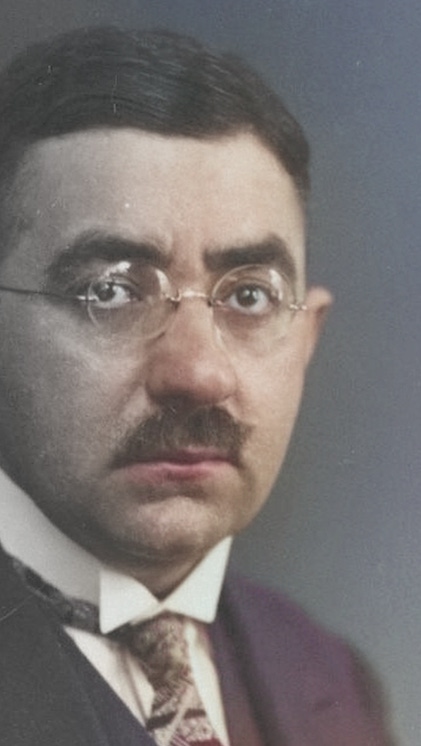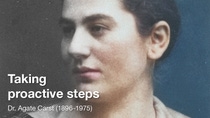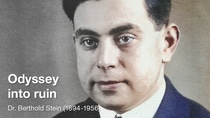Who we are
Gov. Master Builder Max Falkenberg - Despite all the horrors

Lifetime: 1887-1965
Profession: Civil engineer
Employment at the plant: 1921-1938; 1946-1952
Gounds for discrimination/persecution: Jewish [by faith]
Fate: Deportation to Dachau concentration camp; termination of employment; re-employment 1946
November 10, 1938 was a day on which government architect Max Falkenberg was completely powerless. The day after “Kristallnacht” – a night of pogroms orchestrated by the Nazi regime, during which violence against German Jews reached a new level of brutality – he was arrested. Shortly afterwards, he was deported to the Dachau concentration camp, where he endured five weeks, uncertain of his fate. The I.G. Farben plant in Ludwigshafen, Falkenberg’s longstanding employer, successfully campaigned for his release. He was needed for the orderly handover of his work area as a civil engineer, they informed the authorities on November 29, 1938. There was no question of Falkenberg remaining employed beyond this, despite the plant management describing him as someone who “has always proven to be a calm, conscientious and reliable man.” Not someone who “has stood out politically or otherwise.”
“The tremendous moral support”
The dedicated and highly esteemed government architect Max Falkenberg had been employed at the Ludwigshafen plant since 1921. He had known since July 1938 “that it was necessary for him to look for another position.” From the start of 1939, he had been receiving what was referred to as “waiting pay” after his employment contract was terminated at the end of 1938. By mutual agreement, as it was termed at the time. “Waiting pay” refers, then as now, to payments that can be claimed by employees who have taken early or temporary retirement.
Although he was faced with ruin, Falkenberg remained dedicated: “I would like to thank you for the courtesy you have shown me, as well as the trust placed in me in the course of my service so far, which I will continue to repay in the future,” he wrote in September 1938 in connection with his planned departure from I.G. Farben. Even the increasingly precarious circumstances he faced could not shake his loyalty: Max Falkenberg was devoted to the company, but still had to feverishly search for alternative employment.
Hopes that he would be able to take up a position in Turkey with the assistance of I.G. Farben soon evaporated. In February 1939, Max Falkenberg wrote: “I now need to search diligently for other ways of emigrating.” His attempts failed. Although Max Falkenberg was considered a “full Jew,” [Nazi terminology] he was able to survive in a “mixed marriage” with an “Aryan” woman [Nazi terminology]. At least, according to his own affidavit in 1947 (as part of the I.G. Farben Trials in Nuremberg), he “received monthly waiting pay regularly and without interruption” from his former employer. Crucial support in difficult times, as he further emphasizes: “I reflect far less on the material assistance than on the tremendous moral support provided to me during this difficult time by the company management, which gave both me and my wife the strength to endure.”
“Back in his old field of work”
After the war, Max Falkenberg knocked on BASF’s door again, apparently unwavering in his determination to re-establish himself professionally. “Since Mr. Falkenberg served our company with outstanding diligence, we intend to employ him again in his old field of work,” BASF stated in March 1946.
Somewhere between deep gratitude and bitter disappointment, Max Falkenberg chose clear words shortly after the war:
“Even though the management eased my situation through the provision of financial support […], as a non-Aryan [Nazi terminology], I still had to endure hardships, harassment and actions taken by the government and party of the Third Reich from 1938 that defied all human decency far more than was generally known […].”
Max Falkenberg described his suffering over the previous years in more detail in a questionnaire he filled out for the French military government:
“As a racial Jew [Nazi terminology], I was removed from my position at the Ludwigshafen plant of I.G. Farbenindustrie A.G. in 1938, branded in public by the yellow star, subjected to constant humiliation, despised and insulted, restricted in my freedom of movement, and endured severe hardships, including the withholding of food and clothing ration cards and significant economic losses […].”
Max Falkenberg’s post-war correspondence also shows that his health was shattered by the years of persecution, and especially by the imprisonment in Dachau. As a result, he was repeatedly forced to take extended sick leave in his later years at BASF. In February 1952 Max Falkenberg was granted leave of absence from work. On December 31, 1952, 14 years after being forced to leave his position so undeservedly and involuntarily, Max Falkenberg officially retired from BASF. He died in February 1965.


